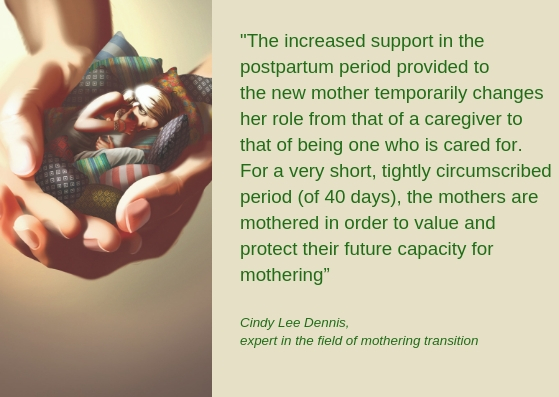
Caring for Moms in the Postnatal Period (Tips for an Easier Transition)
Giving birth may be one of the most impactful events in a woman’s lifetime. Yet, when the excitement of the big occasion has passed, mothers are often left feeling lonely, bewildered and exhausted. Psychologist and EMDR therapist, Mirena Radulova sheds some light on the postnatal period and how we can – and why we should – “mother the mother” in this special and sensitive time.
A vulnerable time for new mothers
During the relatively brief event of the birth, the woman’s body and psyche go through an incredible transformation. Within a ‘split second’ (or after 20 hours of labour!), nothing is the same again. It is a new beginning.
This sudden and intense transition may leave a mother in a state of increased vulnerability and/or susceptible to postpartum depression or post-traumatic stress disorder (PTSD) (especially if she experienced a traumatic delivery).
A postpartum woman might feel exhausted, empty, inadequate, insecure, sad, frightened of failing, and even simply hungry (because she doesn’t have enough time or energy to prepare nourishing food). Stress during the first weeks after labour can also contribute to difficulties with breastfeeding, slow the healing of the womb, and lead to issues with bonding between mother and child.
New mothers long for help, too often without expressing this. They feel drained but put on a brave face – carrying on because their family is no longer around and their partner has gone back to work.
A mother can also feel unseen or invisible, because there is no witness to what she is going through. Perhaps she had to get up seven times during the night to breastfeed, but today she has so much else to do (like cooking, shopping, laundry, walking the dog). She may feel she is living life in a bubble, and that everyone is too busy to notice her isolation. She might feel that her experience of new motherhood is invalid or that there is something wrong with her. (After all, she’s meant to be happy, right?)
Many people – moms included – don’t realise that it takes around six weeks to heal from the physical impact of labour and that it can take even longer to settle into the new role of mother.
Respecting this precious time
Allowing six weeks (40 days) of care and rest gives legitimacy to all the feelings the new mom is experiencing. It sends the message to the new mother that she is allowed to feel like this – it is to be expected – and that she is completely normal. It is vital that she is served in this time, and made to feel like a queen.
With our fast-paced lives, we may feel this is unrealistic. It is important to understand, however, that this particular and unique time establishes patterns that will affect the individual and the family for decades.
Involving the extended family, has long been accepted practice, as is the partner taking an extended vacation from work – but these forms of support are not available to everyone. Fortunately, there are creative ways to approach this. For example, local help or a trained postnatal doula could help care for the mother during the six weeks after birth. Arranging a roster with friends to cook one warm meal a day and do the housework once in a while will help too.
Many parents-to-be are not aware that they can prepare for this time, and that doing so can make the world of difference to both the mother and the rest of the family. Look for this help while preparing for the birth and set up a support system that suits your family’s personal needs, so the mother is cared for.
Some benefits of postnatal support
- Provides time to heal and consolidate, so the new mother is better able to nurture both herself and her baby.
- Accelerates healing of the womb and any scars.
- Improves bonding between mother, baby and partner.
- Having a support system may play a key role in the prevention of postnatal depression. Nurturing in the form of massages, postnatal rituals and healing ceremonies may also limit the chances of postnatal depression and PTSD.
- Facilitates harmony in relationships within the family.
- Increases the ability to ask for and receive help. When we allow ourselves to receive, it is far easier to give.
- Aids breastfeeding – having help in the house allows a mother to focus on breastfeeding. The support of a postnatal doula, for example, means she can get help, emotional support and education on how to breastfeed in case of difficulties.
- Creates a safe space for the mother to tell her birth story to an active listener.
- Helps the mother to feel connected to a community.
Our wish for you…
The period following the birth of a baby is magical and precious. A woman is transformed – she has to put new skills into practice, she needs rest in order to heal and she needs to get used to her new title, ‘mother’. Whichever way you and your family wish to observe the six-week rest period, may it support you, the new mother, to feel calm, secure and loved as you begin this new chapter of life.
If you’re a mom, what helped you through the first few weeks of motherhood? Do share your tips with the rest of the Expat Nest community. And if you’re not a mom, but know someone who is expecting, feel free to share the article as a gesture of your support.
About the author: Mirena Radulova is a psychologist who focuses on maternal health, anxiety and the healing of trauma. She draws from the humanistic school of psychology and believes in post-traumatic growth, change and self-actualisation.
This article was written using the resources of Postnatal Support Network.





